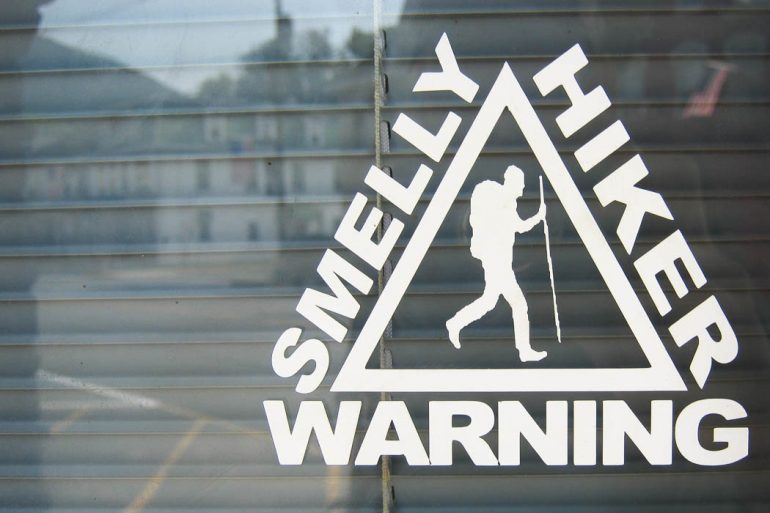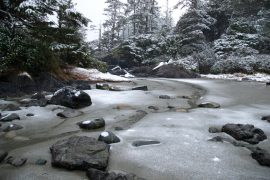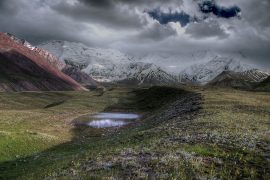This is the first installment in a series on Wilderness Pilgrimage.
I’ve now backpacked around 4,000 miles, and I sometimes wonder what I have learned from those long walks. At first glance, it appears that the only change has been my use of toilet paper. It used to be I’d wad up lots of toilet paper to wipe my butt. I’d just grab a bunch of the white fluffiness, kind of like grabbing a handful of Doritos, and that is what I’d work with (*note: do not wipe with Doritos). That method is rather wasteful to say the least. I have another confession. While thru-hiking the Appalachian Trail, I occasionally “borrowed” toilet paper from fast food stops. Why would I do such a thing, you ask? Because I did not want to buy a whole roll, nor carry a whole roll, nor throw away the excess. On top of that, no place sells single rolls of toilet paper anymore. No hiker needs 6+ rolls at once, and if he does, he should probably stay in the vicinity of white porcelain. And as for the borrowing, I figured that McDonalds wasn’t interested in getting the TP back afterwards. Anyway, since I only had a little TP with me while hiking, I quit wadding it and started folding it to make it last longer. And now, when I wipe, I still fold it. You can really get a lot of crap taken care of with just a few squares. It is truly is amazing. Call it a metaphor for life. Call it the green revolution. Call it anything you want, but life is different for me now. I fold my toilet paper, and I’ll challenge you to pistol fire at dawn if you say wadding is better. My wiping routine is not the only thing that has changed, though. Indeed, I have learned some lessons from long distance hiking—lessons that make for happier hiking and a better life. Here are a few:
People like it when you do cool things.
This may seem like a “no duh” type of statement, but really, it isn’t always that apparent when you are in the midst of life. Before I left, I worried that people would think taking five months to walk 2,200 miles was irresponsible. People would see me as a spoiled kid in his twenties screwing around in the woods instead of entering adulthood. In actuality what I was doing was much more important. I was coating my thru-hike with words such as “self-knowledge” and “discernment” so that I could then get to the important business of being a spoiled kid in his twenties screwing around in the woods instead of entering adulthood. What I mean by the statement “people like it when you do cool things” is I am convinced that thru-hiking got me my first job, despite the fact that my job had next to nothing to do with hiking. Thru-hiking made me stand out. People who don’t know you but have heard you hiked the AT want to know all about that experience because, once again, people like it when you do cool things. When we follow our dreams, it inspires other people to follow theirs, and people like to be inspired. Theologian Howard Thurman said, “Don’t ask what the world needs. Ask what makes you come alive, and go do it, because what the world needs is people who have come alive.” How rarely do we actually live out those inspiring quote magnets that stick to our refrigerators, the ones that say: “May you Live all the days of your life…” or “Go confidently in the direction of your dreams….” When the cute quotations become more than magnets, people are impressed. So, if you want to go on an adventure but are worried about keeping up appearances, don’t. People like it when you do cool things.
Purism often misses the point.
One night not long after we started, my companions and I were eating dinner at a shelter. Some NOBOs (Northbound thru-hikers) walked in from a side trail. We talked for a bit. They started back up the same trail they had from which they came to get back to the AT. It was about a third of a mile long. We pointed out that the AT picked up again right outside the shelter, that you could see the trail. They insisted on walking back on the same trail they came, since they were “purists,” meaning they couldn’t miss a single step of the trail. They cursed their stupidity for being purists as they went out. They said, “Don’t do it if you don’t have to.” And we looked at each other, and just thought, “Man, that is stupid.” These guys were putting stringent rules on thru-hiking the Appalachian Trail. Now, forgive me if I’m wrong, but isn’t the point of hiking to get away from rules and conventions for awhile? You are walking from Maine to Georgia—why make yourself miserable by being a legalist? That doesn’t mean there isn’t a line. If you are doing more hitching than hiking, or taking every opportunity to not hike on the AT, you are missing the point just as much, and in a worse way. But here’s the thing- don’t miss out on a cool experience on the trail, or in life for that matter, just to follow rules for rules’ sake. The best example of this that I can think of is the day we found we could take inner-tubes down the Housatonic River on a 10ish mile stretch that paralleled the AT. An “aqua-blaze.” Now, I can just about guarantee that if I had hiked those 10 miles on the AT, I wouldn’t remember much at all about some small stretch of trail in Connecticut. But I will never forget the joy of floating that river, cold beer in hand, soaking in life. The AT changes every year. The trail today is hardly the same as the trail Earl Schaffer walked as the first thru-hiker. If a short side trail looks amazing, take it every now and then. Don’t be hindered by rules. I can almost hear the legalists’ indignation now, but pay no mind. “Hike your own hike,” and live your own life. Make it the best hike and life possible.
Growing up is for suckers.
I used to think that I would hike the Trail and then grow up and that would be my big adventure and I would move on to more mature, grown up things. I could go and tell tales of bears in the bars and that would be that. I then spent a couple years living in a city in the deep South, however, and I told a lot of stories. It wasn’t all that it’s cracked up to be. Something happened when I climbed Clingmans Dome, and I should have paid better attention to that something. When we went up the Dome, we were mostly done with our hike. We were Southbounders, and Clingmans Dome is towards the end. It is the tallest point on the AT, and in many ways, an abomination. There is a paved road and a big tower where people can waddle up from their cars and take a picture and say how cold it is, and then waddle back down. And for some reason while I was there I wanted to cry. I didn’t know why then, but I think it was because I was scared to death that the future held for me a relationship with the wilderness where the most I got was to drive my fat butt to some mountaintop, kick some asphalt for a minute or two, catch a view, snap a picture, and then go back home. I wouldn’t even have to get my feet dirty. I thought that was what was supposed to happen when you grew up. I’ve since realized that that would be the death of me, and wouldn’t really be growing up at all. I’d be compromising on who I am, and that is about the least mature thing a person can do. There’s a time and a place for sitting on your laurels and talking about past adventures, but that time and place should probably involve a rocking chair, some bourbon, and a minimum of six decades’ citizenship on this Earth. Until that point, you better be having more adventures. That was a big lesson learned. A fish shouldn’t live on land, people can’t live in the sea, and I sure as hell can’t be happy living away from mountains for all that long. You can’t live in a place you can’t breathe.
Wilderness Pilgrimage helps place us in proper relation to our Creator, to Creation, and ourselves.
This is the greatest lesson that I have learned from all those miles. Wilderness Pilgrimage makes us love the world and better understand Whose world it is. Wilderness Pilgrimage humbles us in ways which we desperately need to be humbled. Wilderness Pilgrimage makes us practice fasting in a meaningful way. Wilderness Pilgrimage teaches us who we are and what is important. Wilderness Pilgrimage garners delight in Creation and Creator, and renews our call to “Glorify God and enjoy God forever.” And, finally, Wilderness Pilgrimage teaches us how to take better care of our crap. Keep an eye out for future installments as I explore these last topics in greater detail.





